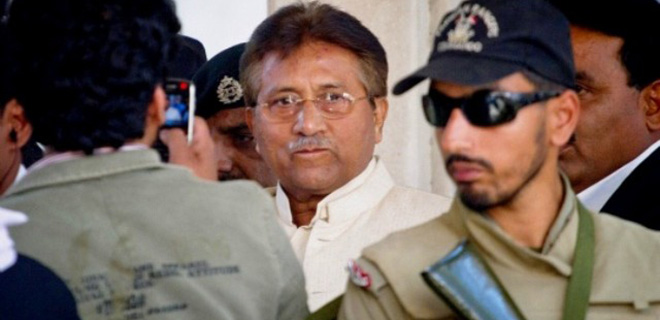Former self-appointed (and then, elected) President Pervez Musharraf recently returned to Pakistan to throw in a bid for power in what looks like a very risky move. He left the office amid political pressure and a looming impeachment hearing.
He became very unpopular in Pakistan after publicly siding with the U.S.-led Global War on Terror (GWOT). Interesting that he is returning now, as the Afghanistan occupation is winding down with UBL out of the picture.
Pakistan, a lot like the Saudis and others, has always been very good at playing both sides when it comes to dealing with America and their own internal politics. It seems like a risky move, as Musharraf attempts to fill the leadership void in Pakistan and grab power once more. He obviously thinks he has a chance, otherwise I don’t think he’d risk returning amid death threats from the Taliban. I also think it’s a safe assumption that he has the support of some very powerful friends, even if it’s not the overt type.
I wonder what three-letter group he’s been talking to…
Pakistan’s Pervez Musharraf: Risking it all?
Pervez Musharraf, Pakistan’s former president, is back home after more than four years in self-imposed exile. He is hoping to re-assert his influence ahead of the country’s elections in May.
Musharraf touched down in Karachi on Sunday morning, despite the possibility of arrest, and a threat from the Taliban to kill him.
“I have put my life in danger by coming back to Pakistan. I was thinking that the government would call me back, and would say ‘Save Pakistan,’ but that did not happen. Today my nation ordered me to come back. I came back, putting my life in danger, to save Pakistan,” the former leader said.
Read Pakistan’s Pervez Musharraf: Risking it all? on Aljazeera English.
Musharraf’s Profile
The return of former President Pervez Musharraf to Pakistan is the latest development in a decade that has seen him fall from the top of his country’s political and security establishment into a quiet life in exile.
Musharraf was born in Delhi in 1943 to parents who fled to Pakistan four years later, shortly before partition. He rose through the ranks of the Pakistani army, eventually being named chief of staff in 1998 under then-prime minister Nawaz Sharif.
He seized power in a coup just one year later, ushering in a period of military rule which would last until 2002. He rebranded himself president after elections that year, and remained in office until 2008, when he was forced out by opposition parties.
Already have an account? Sign In
Two ways to continue to read this article.
Subscribe
$1.99
every 4 weeks
- Unlimited access to all articles
- Support independent journalism
- Ad-free reading experience
Subscribe Now
Recurring Monthly. Cancel Anytime.










COMMENTS